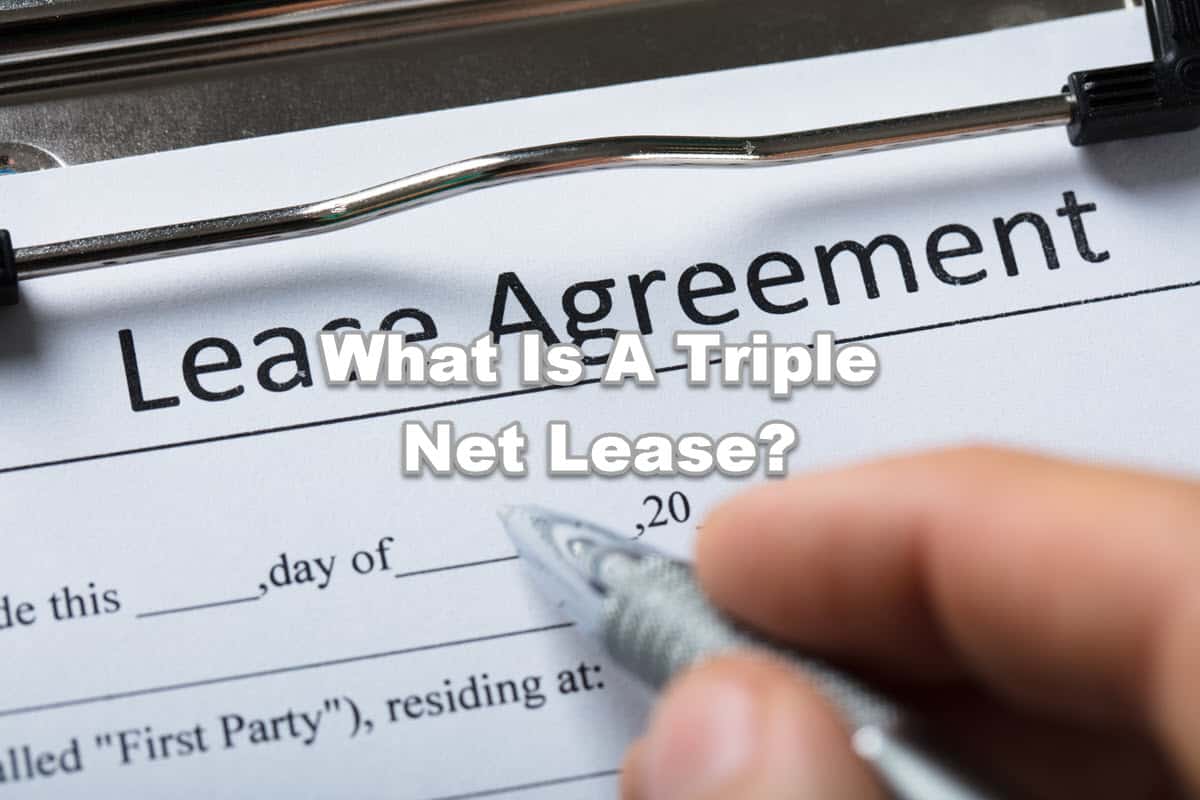
A Triple Net Lease (NNN) is a leasing agreement where the lessee (the person renting) agrees to pay all real estate taxes, building insurance, and maintenance on the property in addition to any normal fees, including rent and utilities.
A Triple Net Lease is also known as a net-net-net lease.
Rent charges tend to be lower in Triple Net Leases compared to standard lease agreements because of the additional expenses.
Triple Net Lease agreements are most commonly used for long-term leases in commercial real estate
Table of Contents
Triple Net Leases vs. Double Net Leases vs. Single Net Leases vs. Gross Leases
A Triple Net Lease has distinct attributes when compared to other forms of leases that businesses should be aware of. The following table highlights some of these key differences:
| Type of Lease | Rent | Property Taxes | Insurance | Maintenance and Repairs |
|---|---|---|---|---|
| Triple Net Lease (NNN) | Tenant Pays | Tenant Pays | Tenant Pays | Tenant Pays |
| Double Net Lease (NN) | Tenant Pays | Tenant Pays | Tenant Pays | Landlord Pays |
| Single Net Lease (N) | Tenant Pays | Tenant Pays | Landlord Pays | Landlord Pays |
| Gross Lease | Tenant Pays | Landlord Pays | Landlord Pays | Landlord Pays |
As clearly indicated, the Triple Net Lease uniquely transfers the financial responsibility of all the property expenses, including property taxes, insurance, and maintenance, to the tenant, unlike other lease types.
This differentiates Triple Net Leases from other lease agreements, positioning it as a popular choice for commercial real estate, especially among restaurant or retail franchises.
Now, let’s take a look at the differences and similarities between the different types of commercial leases.
Triple Net Leases (NNN)
Definition: A Triple Net Lease requires the tenant to pay all real estate taxes, building insurance, and maintenance costs on the property, in addition to their regular rent.
Advantages:
- Landlords have predictable income without unexpected out-of-pocket expenses.
- Tenants may have more control over the property, potentially influencing maintenance decisions and costs.
Disadvantages:
- Tenants bear the brunt of fluctuating costs, which can be financially challenging.
- Landlords might find it harder to attract tenants due to the increased financial burden on the latter.
Double Net Leases (NN)
Definition: In a Double Net Lease, tenants are responsible for both property taxes and building insurance. The landlord typically covers maintenance costs.
Advantages:
- Landlords are shielded from the variability of property taxes and insurance costs.
- Tenants might benefit from slightly lower rents compared to Triple Net Leases due to fewer responsibilities.
Disadvantages:
- Tenants still face the unpredictability of two major property-related expenses.
- Landlords remain responsible for potentially costly maintenance.
Single Net Lease (N)
Definition: With a Single Net Lease, the tenant pays only one of the additional expenses, typically property taxes, on top of their rent. The landlord handles building insurance and maintenance.
Advantages:
- Landlords can predict most of their expenses, with only one variable being covered by the tenant.
- Tenants have fewer additional costs to consider, making budgeting simpler.
Disadvantages:
- Tenants are still exposed to the potential variability of property taxes.
- Landlords bear the majority of property-related expenses.
Gross Leases (Full-Service Leases)
Definition: In a Gross Lease, the tenant pays a singular rent amount, which encompasses all operating expenses. The landlord then manages and pays for property taxes, insurance, and maintenance from this amount.
Advantages:
- Tenants enjoy a straightforward rental agreement with no hidden or additional costs, making budgeting and financial planning simpler.
- Landlords have full control over property management, ensuring that maintenance and repairs are up to their standards.
Disadvantages:
- Tenants might end up paying higher rent compared to other lease structures.
- Landlords absorb all fluctuations in property-related expenses, which can impact profitability.
The choice between these lease types hinges on the preferences and financial strategies of both landlords and tenants.
While some tenants might prioritize budget predictability found in Gross Leases, others might opt for the control and potentially lower costs of Triple Net Leases.
Landlords, on the other hand, must balance their desire for stable income against the responsibilities they’re willing to assume.
As with any contractual agreement, both parties should carefully assess their needs and consult with professionals before making a decision.
Advantages and Disadvantages of Triple Net Leases
Triple net leases have become a prominent fixture in the commercial real estate landscape.
Characterized by their unique structure, these leases shift certain financial responsibilities from the landlord to the tenant, including real estate taxes, building insurance, and maintenance costs.
While this arrangement can offer distinct benefits, it also comes with its set of challenges for both parties involved.
The following breakdown provides a comprehensive look into the pros and cons of triple net leases, helping potential landlords and tenants make informed decisions based on their individual circumstances and priorities.
Pros for Tenants:
- Lower Rent Charges: Rent charges tend to be lower in triple net leases compared to standard lease agreements because of the additional expenses.
- Expense Control: A lease contract allows the tenant to plan and control property expenses.
- Financial Leverage: Businesses can use leverage to reduce the dent in their cash flows. As the value of the property increases, more leverage can be obtained.
- Flexible Choice: The choice between a standard lease and a triple net lease often depends on the specific circumstances of the lessee. Factors such as financial stability, projected business growth, and the lessee’s ability to handle the property’s expenses should be considered.
Cons for Tenants:
- Expense Unpredictability: This kind of lease can involve unpredictability because of the variable maintenance cost.
- Landlord Bias: Triple net leases often favor the landlord. They can pose significant financial risks to tenants if major maintenance or repair work becomes necessary or if property taxes or insurance premiums rise significantly.
- Complex Terms: Understanding the terms and conditions of this type of lease is critical before entering into the agreement.
- Additional Expense Burden: The burden of additional expenses, which are generally variable, can be financially damaging if not appropriately managed. Therefore, the tenant must thoroughly calculate the total cost of leasing before committing to a triple net lease.
- Bondable Lease Limitations: Bondable leases limit the situations in which the tenant can terminate the lease and make the tenant fully responsible for unforeseeable operational risks.
Pros for Landlords:
- Minimized Outflow: It offers advantages as they can minimize capital outflow for property upkeep while collecting a stable income.
- Expense Predictability: The triple net lease protects the landlord from the unpredictability of property expenses.
- Long-term Agreements: These agreements are most commonly used for long-term leases in commercial real estate.
Cons for Landlords:
- Lower Rent Income: Potential for Lower Rent Income: Since tenants are responsible for additional expenses, the base rent in a triple net lease is often lower than that of a standard lease.
- Tenant Screening: Landlords might need to be more thorough in screening potential tenants to ensure they can handle the additional financial responsibilities. This can increase the time and cost associated with finding a suitable tenant.
- Vacancy Risks: If tenants find the additional expenses too burdensome or unpredictable, there might be a higher risk of vacancies as tenants might opt for more straightforward lease structures elsewhere.
- Maintenance Neglect: Since tenants are responsible for maintenance, there’s a risk they might neglect necessary repairs or opt for cheaper, less durable solutions, potentially affecting the property’s long-term value.
- Complex Negotiations: Triple net leases can be more complex to negotiate, given the need to clearly define who is responsible for what, potentially leading to longer negotiation periods or legal disputes.
- Dependence on Tenant’s Financial Health: If a tenant faces financial difficulties, they might struggle to cover their maintenance, tax, and insurance obligations, potentially leading to issues for the landlord.
- Potential for Property Mismanagement: If tenants are responsible for property management aspects, they might not always make decisions in the best interest of the property’s long-term value.
Investing in Triple Net Leases
Triple Net Leases (NNN) have become an attractive investment avenue in the commercial real estate sector.
Distinct from traditional real estate investments, NNN leases offer a unique structure where the tenant assumes many of the property-related expenses, including real estate taxes, building insurance, and maintenance costs.
This arrangement can provide investors with a more predictable income stream and fewer management responsibilities.
Benefits of Investing in Triple Net Leases
Stable Income Stream: One of the primary attractions of NNN investments is the stability they offer. Since tenants cover most of the variable property expenses, landlords or investors can anticipate a consistent revenue flow. This predictability is especially appealing to investors looking for long-term, passive income sources.
Low Management Responsibilities: With tenants handling maintenance and other property-related tasks, investors have fewer day-to-day management duties. This hands-off approach is ideal for those who want to invest in real estate but are deterred by the operational challenges.
Long-term Leases: Triple Net Leases are often associated with longer lease terms, sometimes spanning a decade or more. Such extended durations can provide investors with long-term security, knowing that their property will generate income for years to come.
Potential for Property Appreciation: While the immediate benefits of NNN leases lie in the rental income, there’s also the potential for property appreciation. If the property’s value increases over time, investors stand to gain from both the lease income and the property’s capital appreciation.
Tax Advantages of Triple Net Lease Investments
- Depreciation: One of the primary tax benefits for real estate investors is the ability to depreciate the value of the property over time. This depreciation can offset rental income, reducing taxable income.
- 1031 Exchange: Also known as a like-kind exchange, this provision allows investors to defer capital gains taxes when selling a property if they reinvest the proceeds in a similar property. Many Triple Net Lease investors utilize 1031 exchanges to upgrade their portfolios without incurring immediate tax liabilities.
- Interest Deductions: If an investor has taken out a mortgage to finance the property purchase, the interest on that loan is typically tax-deductible, further reducing taxable income.
- Pass-Through Deduction: With the Tax Cuts and Jobs Act, certain real estate investors may qualify for a pass-through deduction, allowing them to deduct up to 20% of their qualified business income.
- Lower Tax on Long-Term Capital Gains: If an investor holds onto a Triple Net Lease property for more than a year before selling, any profits from the sale are taxed at the long-term capital gains rate, which is typically lower than the ordinary income tax rate.
Considerations and Risks
Tenant Dependability: The success of a Triple Net Lease investment hinges significantly on the tenant’s financial stability. If a tenant defaults or faces financial hardships, it can impact the investment’s returns.
Market Fluctuations: While NNN leases offer more predictability than other real estate investments, they’re not immune to market downturns. If the commercial real estate market faces a slump, it might affect property values and the potential for future rent increases.
Contractual Nuances: Triple Net Leases can be complex, with specific terms and conditions that both parties must adhere to. Investors need to be thorough in understanding these nuances to ensure they’re adequately protected.
As with any investment, due diligence, understanding the market, and consulting with real estate professionals are crucial steps before diving into the world of NNN lease investments.
Final Thoughts
A Triple Net Lease (NNN) is a commercial lease structure that places financial responsibility for property expenses on the tenant.
This type of lease allows landlords to have a predictable cash flow while tenants have more control over the property and potential tax deductions.
However, it’s important for both parties to carefully review and negotiate the terms of the lease to ensure a fair agreement.
Office Space For Lease
We have Office Space For Lease in Sterling Heights and in Macomb County. Please contact us by email or call us at (586) 262-6270 , and we’ll be happy to help you find the perfect office space for you and your business.
FAQs
What is a triple net lease?
A triple net lease is a type of commercial real estate lease where the tenant is responsible for paying not only rent but also property taxes, insurance, and maintenance expenses.
How does a triple net lease benefit the landlord?
A triple net lease benefits the landlord by transferring many financial responsibilities to the tenant, reducing their costs, and increasing their return on investment.
What are the advantages of a triple net lease for tenants?
For tenants, the advantages of a triple net lease include greater control over their space, potential tax benefits from deductible expenses, and often lower base rental rates compared to other leasing structures.
Are there any risks associated with signing a triple net lease as a tenant?
Yes, there are risks involved in signing a triple-net lease as a tenant since they bear responsibility for additional expenses, which can fluctuate and potentially increase over time. It’s important to carefully review the terms before committing to ensure it aligns with your long-term business plans.
Lease Office Space in Macomb County
Are you looking to lease office space in Sterling Heights or Macomb County? Please contact us by email or call us at (586) 262-6270 , and we’ll be happy to help you find the perfect office space for you and your business.



Leave a Reply